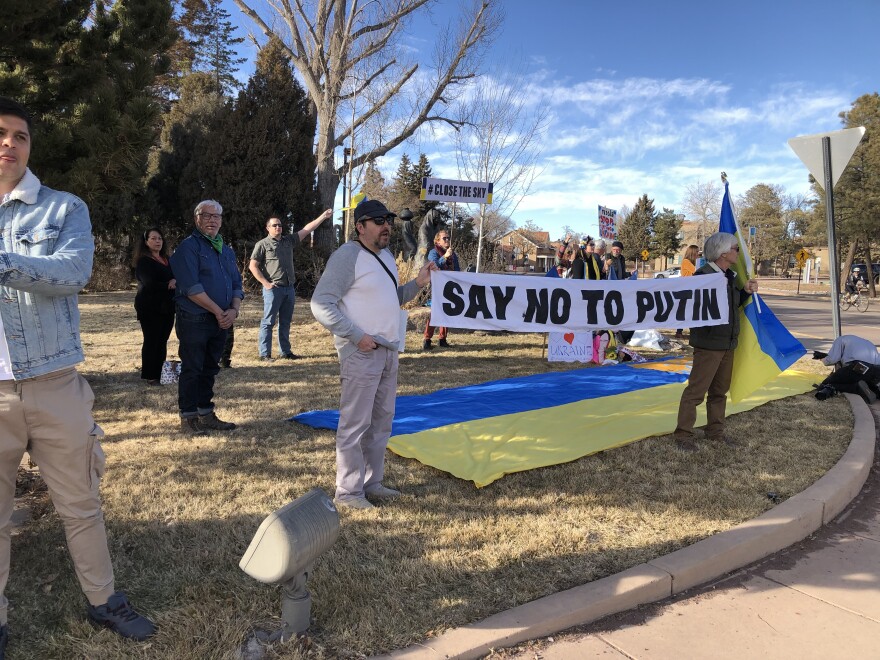Outside the Roundhouse in Santa Fe, a handful of people wave blue-and-yellow flags and sing the Ukrainian national anthem. Unfurling banners, Ukrainians, Ukrainian-Americans and their supporters wave posters at passing traffic and chant "Stop Putin" as passing cars honk in support.
Since last week, their world has been turned upside down. The Russian land invasion and bombing campaign has shattered cities, and sent refugees streaming hundreds of miles in search of safety.
"It was a real, real shock," said Nataliya Pavlenko Edelman, who was leading the little demonstration. Three weeks ago, as Russian troops massed on her country's borders, she told her friends and relatives, "Please, go buy some food. Have some candles." But they didn't believe that Russia would invade.
Now, her little town of Bucha outside Kyiv, has been devastated by fighting. "They bombed them for eight hours," she said. "And it was a really beautiful, beautiful little town. We have forests around, and houses around…We had a park, with flowers everywhere."
She was messaging with her brother during one bomb attack, when the connection was lost. It took 24 agonizing hours before she heard that he was safe.
Edelman leads the Ukrainian Americans of New Mexico, which is trying to go from being a mainly cultural and social group, to raising awareness of the new war in their homeland and support for Ukrainian people. The members gathered outside the Roundhouse switched from telling stories about people back home, in shocked disbelief, to asking how they should phrase their demands to politicians.
"What is the right way to say, we want to close the sky?" asked Edelman, as she worried about aerial bombardment of Ukrainian cities.
"I'm really close to Ukraine, because all my relatives, my mom, friends, everybody's there," said Mychaylo Bilichak, who lives in Albuquerque but is from western Ukraine. His family is trying to assist displaced people pouring into the relatively safe part of the country.
"We are trying to help somehow, like sending money, getting some products, medicine," he said. "They left their houses with everything they got, and left, so they need anything, anything will be helpful."
In Albuquerque, one bastion of Ukrainian culture is the Red Rock deli, where Alissa Toczek's loyal fans come for her signature dish: Ukrainian borscht.
"I'm not against any nationalities," she said, smiling, as the lunch rush started. "But to make really Ukrainian borscht, you have to be Ukrainian."
For weeks, her customers have been asking about the worrying situation back home.
"I would give a million percent that it would never happen," she said. "I was born in the Soviet Union, and it was one big, huge country and we were always friends, all the nationalities."
So when a friend called her with news of the invasion, she couldn't believe it, and in a way still doesn't.
"I do realize," she said. "I do see a lot of terrible pictures and videos, but my brain and my heart – they don't want to understand and get it. Just literally, it's very painful."
As world leaders meet for talks and summits, she said she had a message for them: "Our life, life of ordinary simple people, matters as well. Not just their ambitions, their desires or whatever - we do matter, even if we are small people."
Toczek keeps making borscht and traditional pastries for the deli, but doesn't have an appetite herself, as food runs short back home.
"I have in my head that my friends, my relatives, they don't have that chance to eat what I can," she said. "And I know it's not my fault. But I have that thing in my chest. It's really terrible."


